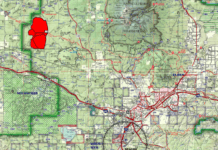It’s been nearly three years since Gov. Doug Ducey signed legislation disallowing cities or counties from prohibiting short-term vacation rentals.
And while many have taken advantage of the law financially by renting parts or all of their homes to visitors, the result has also left many scrambling to find housing. From day one, this issue has been a hot topic in Sedona as well as other communities throughout the state. While it’s highly unlikely Senate Bill 1350 will ever be reversed, some county-level elected officials are hoping to give a few rights back to the cities they represent.
Each year the state’s 64 county supervisors meet to address and vote upon issues they’d like to see presented to the state legislature. One of the eight that were recently decided upon deals with short-term vacation rentals.
“It’s had a major impact on neighborhoods and workforce housing,” Yavapai County District 3 Supervisor and Chairman Randy Garrison said last week. “In most parts of the state, this is not an issue. But certain communities, like Sedona, have been impacted more than others.”
The legislation being proposed would allow local communities to regulate investor-owned short-term vacation rentals to mitigate the impact on residential neighborhoods. It would clearly define commercial activity within statute to create equity and uniformity with traditional hotels and the short-term rental industry.
“This gives communities some rights back to protect their neighborhoods,” he said.
Following the signing of SB 1350, local governments were allowed to continue to regulate vacation rentals for the protection of public health and safety; enforce residential use and zoning ordinances; and limit or prohibit the use of a short-term rental for specified purposes. But that’s about it.
“The business model for short-term rentals has shifted the market to operate more like a traditional short-term lodging establishment, renting from two to seven days, with several different sets of guests rotating in and out of the residence over the course of a month,” the legislation from the supervisors states.
It goes on to state that earlier this year the Arizona Legislature recognized that the situation had gotten out of hand and passed House Bill 2027, which specified a short-term rental may not be used for nonresidential uses including special events that would require a permit or license.
It also allowed local governments to require these owners to provide contact information for someone who is responsible for responding to complaints in a timely manner. Some communities saw this as a small victory.
“At this point it’s hard to put the genie back in the bottle,” Garrison said.
An online lodging operator or vacation rental owner is required to be registered with the Arizona Department of Revenue to file and pay all online lodging transaction privilege taxes.
The document states that traditional lodging establishments are required to follow state, county and municipal laws and regulation and pay commercial property taxes. However, short-term vacation rentals operate almost exclusively within residential neighborhoods and lack of clarity in state statute has allowed these businesses to avoid comparable property taxes.
The proposal seeks to establish a legislative mechanism for local ordinance regulation over investor-owned properties used for vacation rentals and to clearly define within statute what is commercial activity to create property tax equity and uniformity between vacation rentals and traditional lodging establishments.
The proposal also recommends working with the League of Arizona Cities and Towns on their resolution to permit their members to address the proliferation of investor-owned short-term rentals.
Garrison emphasized this is not a zone change but instead a change in classification of the property for tax purposes from residential to commercial.
“We don’t want to step on the rights of any property owner,” he said. “But these investors are acting more like business owners than homeowners and they should be taxed as such.”






















